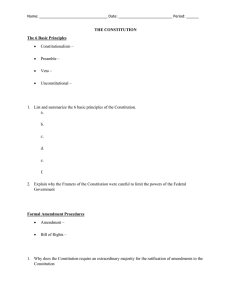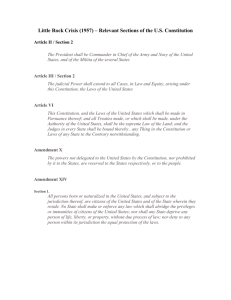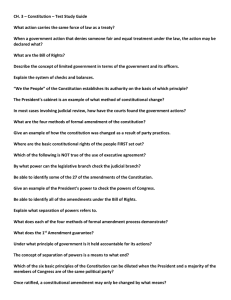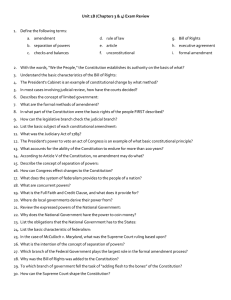Foundations: Background to American History
advertisement
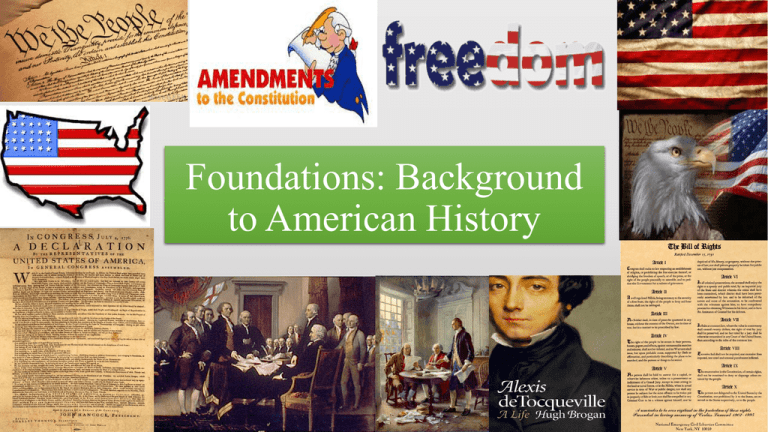
Foundations: Background to American History Copy the following EQ on Page 2 What do the Declaration of Independence, U.S. Constitution, and the Bill of Rights say? Copy the following Graphic Organizer on page 1 The Declaration of Independence • Signed in 1776 – written by Thomas Jefferson • When sent to the colonies the only signature was that of John Hancock, which he made so large that King George III could read it without glasses. • Freed colonies from Britain and put forward a theory of government. • The Declaration explained that the purpose of government should be to protect its citizens’ unalienable rights – rights that cannot be taken away – “life, liberty, and the pursuit of happiness” • Ordinary citizens have the right to overthrow an oppressive government that failed to protect these unalienable rights. The U.S. Constitution • Signed in 1787 – established the basic structure of our national government, the power is with the people who elect their own representatives • Created an elected President, a Congress with two houses, and a Supreme Court • The Constitution made federal law supreme over state law. The U.S. Constitution • Limited government: the powers of the federal government were limited to those specifically provided in the Constitution. • Republicanism: Americans created a republican form of government – a democratic government of representatives elected by the people. • Popular Sovereignty: the people are “sovereign” – they hold supreme power. The powers of the government thus come from the consent of the governed. • Federalism: the authors of the U.S. Constitution created a “federal republic.” The powers of government were divided between the national government and the states. State governments continued to enjoy control over local matters, such as education and the passing of laws defining most crimes. The U.S. Constitution • Checks and Balances: to prevent any one branch from becoming too powerful, the Constitution gave each branch ways to stop or “check” the other branches. The Supreme Court turned out to be especially important because it made sure that the other branches respected the Constitution. • Separation of Powers: The authors of the U.S. Constitution decided to divide the powers of the federal government among three separate branches: the Congress, the President, and the Supreme Court. • Amendments: The Constitution could be amended to take into account important changes. This allowed the Constitution to adjust to changing times and attitudes. The Bill of Rights • First Amendment: Freedom of religion, speech, the press, right to assembly, right to petition. • Second Amendment: right to “bear arms” (carry weapons) • Third Amendment: prohibits government from placing troops in people’s homes without their permission. • Fourth Amendment: protect individuals from “unreasonable” searches and seizures by government officials. (search warrant) • Fifth Amendment: citizen cannot be deprived of life, liberty. Or property without “due process of law” – double jeopardy, self-incrimination, eminent domain. The Bill of Rights • Sixth Amendment: guarantees a fair and impartial trial to all persons accused of a crime. • Seventh Amendment: guarantees the right to a trial by jury in many civil disputes. • Eighth Amendment: federal courts cannot require unusually high bail. • Ninth Amendment: citizens hold rights other than those listed in the Constitution • Tenth Amendment: federal government has only those powers specifically given to it in the Constitution. Copy the following EQ on Page 4 What factors led to America’s exceptional success as a democratic republic? Alexis de Tocqueville • 1831 sent to America by French government to study our prisons in order to help the French government reform its own prison system. • He wonders how it was that the American system of democracy had survived so well, when France had undergone a series of revolutions and restorations during the same years and still unstable. • 1835 – published Democracy in America – Historians studying his book identified five values that he found crucial to America’s success. Alexis de Tocqueville • Egalitarianism: refers to a society of equals. Two exceptions were slavery and Native Americans. • Populism: (popular sovereignty) participation of the common people in political life. • Liberty: protection against a tyrannical government. Federal system to prevent the rise of a an over-powerful government. • Individualism: free to flourish without hereditary distinctions, individuals organized into their own private associations. • Laissez-faire: government took a “hands off” approach to the economy. The Evolution of Mid-Nineteenth Century America, 1830-1865 • After Tocqueville’s visit the U.S. continued to grow in both area and population. • Early 19th century there were three main sections – North, South, and West – each affected differently by the rise of industry. • These differences led to the Civil War (18611865) • In the period following the Civil War a group of amendments were passed. • 13th Amendment – abolished slavery • 14th Amendment – guaranteed all citizens “due process rights” and “equal protection” of the laws from state governments. • 15th Amendment – prohibited denying individuals their right to vote on the basis of race The Evolution of Mid-Nineteenth Century America, 1830-1865 • The Great Plains were open to settlement, new railroad lines crisscrossed the nation, the Northeast accelerated its industrial growth as people began to move from the country side into the cities. Alexis de Tocqueville • De Tocqueville gave us 5 values he felt were crucial to the success of our nation’s government. • ON A SEPARATE SHEET OF PAPER In 5 sentences tell me which TWO you believe were the most crucial to our nation’s government being a success and why?

